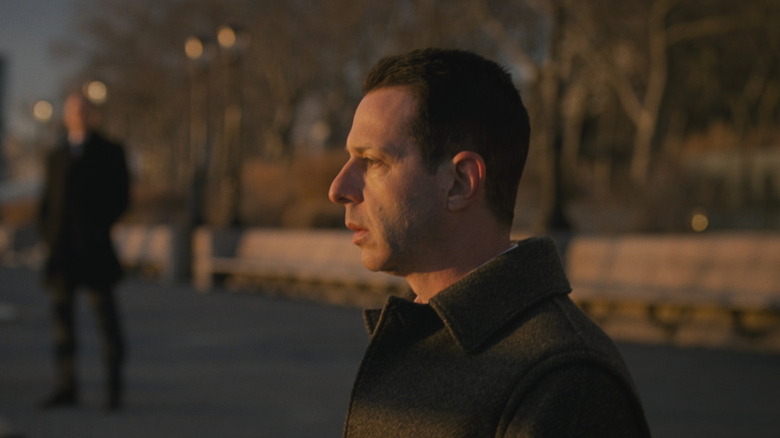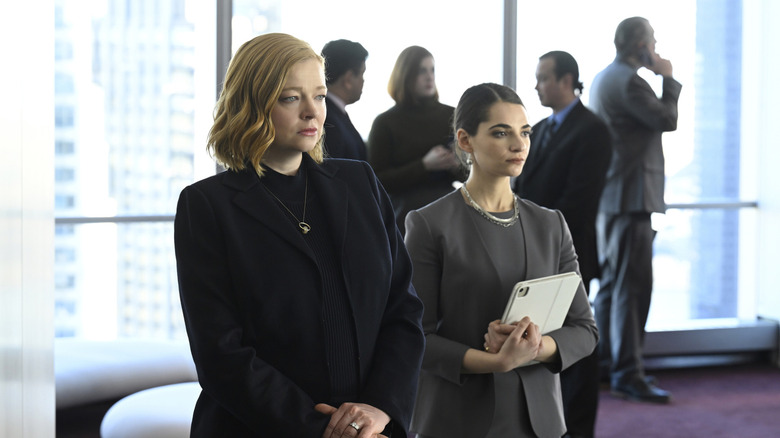The Succession Series Finale Did What Game Of Thrones Couldn't
Contains spoilers for "Succession" Season 4 Episode 10 — "With Open Eyes"
A new CEO was always going to be crowned during the series finale of "Succession." This was an inevitability; it's literally right there in the show's title. Revealing that the new king of the Roy family empire would be Tom Wambsgans (Matthew Macfadyen), though, was at once shocking and completely expected, and that's because "Succession" built its tension so effectively and precisely in a way that another HBO tentpole about people squabbling over power simply couldn't pull off.
Everyone knows the "Game of Thrones" series finale absolutely sucked. Yes, Daenerys Targaryen (Emilia Clarke) was probably always going to become the "Mad Queen" and do a little bit of a geoncide... but the way it happened made fans understandably furious. When it comes to cultural goodwill, "Game of Thrones" managed to basically erase every ounce of its capital overnight; a show that was once the central topic of nearly every watercooler conversation died not with a bang, but with the quietest of whimpers.
"Succession," on the other hand? This show will be discussed for years, because it managed to make its expected ending into one of the most tense installments of television in recent memory. Kendall Roy (Jeremy Strong) always had to fail — and yet, this show spent its final ninety minutes on television making a convincing argument that he wouldn't. Daenerys and Kendall's fates were always set, but where "Game of Thrones" failed to stick its landing, "Succession" pulled off its finale perfectly.
Having an inevitable ending isn't a bad thing...
Just because the ending of something is an inevitability doesn't mean it's a bad thing. "Succession" takes heavy inspiration from Shakespeare's "King Lear," and the Bard himself stuck to a strict formula when it came to his endings: tragedies ended in death, and comedies ended in weddings. (There are a few plays that end in neither, which are referred to as "problem plays," but that's for a different article.) Realistically, none of the Roy children could possibly carry on their father's legacy, Kendall least of all. Logan Roy (Brian Cox) told his children that they were "not serious people" shortly before his death in the third episode of Season 4, and he wasn't wrong — especially when it comes to Kendall, who mostly speaks in business word salads that go on at length while saying nothing at all.
That's why Tom Wambsgans, the estranged husband of Shiv Roy (Sarah Snook), becoming the American CEO after the GoJo sale is approved by the board is poetic and perfect; he's not a member of the Roy family by blood, which, when push comes to shove, makes him uniquely qualified for the role. Contrast this with the clumsy ending of "Game of Thrones," where a new King of the Seven Kingdoms is chosen seemingly at random, with Bran Stark (Isaac Hempstead-Wright) earning the title after spending the series doing nothing at all. Take issue with Tom all you want, but pretending he hasn't struggled and toiled for the top spot is ridiculous; Bran was such a third-rate character that he was absent for an entire season of the series.
...but there's a right way to do it, and Succession pulled it off
The bottom line here is that both "Game of Thrones" and "Succession" had endings that were relatively easy to predict. Throughout all of "Succession," Tom and his acolyte Greg (Nicholas Braun) were always name-checked as the two characters that would probably win it all at the end of the day, and on "Game of Thrones," Daenerys seemed destined for ruin. The way these two shows pulled off their expected endings, though, is what's important.
Where "Game of Thrones" had Daenerys go insane so quickly that she massacred a bunch of women in children in the blink of an eye, "Succession" spent its entire time on television portraying Tom Wambsgans as a "striver," as Shiv called him during their argument in the final season's seventh episode. Even within the finale itself, the cogs turned both obviously and subtly. Shiv is fully allied with her brothers and ready to bring the GoJo deal down until Tom tells her that he'll be named as the CEO, a position originally promised to Shiv herself... and from there, Shiv, who's pregnant with Tom's baby, clearly sets the wheels in motion to be the wife of the CEO and mother to a future heir.
Nothing about the finale of either "Succession" or "Game of Thrones" was truly shocking — except that "Succession" completed its expected arc in a satisfying way, and "Game of Thrones" utterly failed. Dunking on the "Game of Thrones" series finale is nothing new, but years after that show ended, "Succession" showed up to eat its lunch, so to speak.


